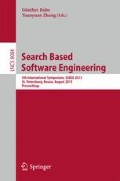Abstract
Genetic Programming (GP) has long been applied to several SBSE problems. Recently there has been much interest in using GP and its variants to solve demanding problems in which the code evolved by GP is intended for deployment. This paper investigates the application of genetic improvement to a challenging problem of improving a well-studied system: a Boolean satisfiability (SAT) solver called MiniSAT. Many programmers have tried to make this very popular solver even faster and a separate SAT competition track has been created to facilitate this goal. Thus genetically improving MiniSAT poses a great challenge. Moreover, due to a wide range of applications of SAT solving technologies any improvement could have a great impact. Our initial results show that there is some room for improvement. However, a significantly more efficient version of MiniSAT is yet to be discovered.
Access this chapter
Tax calculation will be finalised at checkout
Purchases are for personal use only
Preview
Unable to display preview. Download preview PDF.
References
MiniSAT hack competition. In 2013 this is part of the 16th International Conference on Theory and Applications of Satisfiability Testing (2013)
Arcuri, A., White, D.R., Clark, J., Yao, X.: Multi-objective Improvement of Software Using Co-evolution and Smart Seeding. In: Li, X., et al. (eds.) SEAL 2008. LNCS, vol. 5361, pp. 61–70. Springer, Heidelberg (2008)
Arcuri, A., Yao, X.: A novel co-evolutionary approach to automatic software bug fixing. In: Wang, J. (ed.) 2008 IEEE World Congress on Computational Intelligence, Hong Kong, June 1-6. IEEE Computational Intelligence Society, IEEE Press (2008)
Bjørner, D., Ershov, A.P., Jones, N.D.: Partial evaluation and mixed computation. North–Holland (1987)
Eén, N., Sörensson, N.: An extensible SAT-solver. In: Giunchiglia, E., Tacchella, A. (eds.) SAT 2003. LNCS, vol. 2919, pp. 502–518. Springer, Heidelberg (2004)
Fry, Z.P., Landau, B., Weimer, W.: A human study of patch maintainability. In: International Symposium on Software Testing and Analysis (ISSTA 2012), Minneapolis, Minnesota, USA (July 2012) (to appear)
Goues, C.L., Dewey-Vogt, M., Forrest, S., Weimer, W.: A systematic study of automated program repair: Fixing 55 out of 105 bugs for $8 each. In: International Conference on Software Engineering (ICSE 2012), Zurich, Switzerland (2012)
Harman, M., Langdon, W.B., Jia, Y., White, D.R., Arcuri, A., Clark, J.A.: The GISMOE challenge: Constructing the pareto program surface using genetic programming to find better programs (keynote paper). In: 27th IEEE/ACM International Conference on Automated Software Engineering (ASE 2012), Essen, Germany (September 2012)
Langdon, W.B., Harman, M.: Evolving a CUDA kernel from an nVidia template. In: Sobrevilla, P. (ed.) 2010 IEEE World Congress on Computational Intelligence, Barcelona, July 18-23, pp. 2376–2383. IEEE (2010)
Langdon, W.B., Harman, M.: Genetically improving 50000 lines of C++. Research Note RN/12/09, Department of Computer Science, University College London, Gower Street, London WC1E 6BT, UK (September 19, 2012)
Le Goues, C., Nguyen, T., Forrest, S., Weimer, W.: GenProg: A generic method for automatic software repair. IEEE Transactions on Software Engineering 38(1), 54–72 (2012)
Orlov, M., Sipper, M.: Flight of the FINCH through the Java wilderness. IEEE Transactions on Evolutionary Computation 15(2), 166–182 (2011)
Silva, J.P.M., Lynce, I., Malik, S.: Conflict-driven clause learning SAT solvers. In: Biere, A., Heule, M., van Maaren, H., Walsh, T. (eds.) Handbook of Satisfiability. Frontiers in Artificial Intelligence and Applications, vol. 185, pp. 131–153. IOS Press (2009)
Weimer, W., Nguyen, T.V., Goues, C.L., Forrest, S.: Automatically finding patches using genetic programming. In: International Conference on Software Engineering (ICSE 2009), Vancouver, Canada, pp. 364–374 (2009)
White, D.R., Arcuri, A., Clark, J.A.: Evolutionary improvement of programs. IEEE Transactions on Evolutionary Computation 15(4), 515–538 (2011)
Author information
Authors and Affiliations
Editor information
Editors and Affiliations
Rights and permissions
Copyright information
© 2013 Springer-Verlag Berlin Heidelberg
About this paper
Cite this paper
Petke, J., Langdon, W.B., Harman, M. (2013). Applying Genetic Improvement to MiniSAT. In: Ruhe, G., Zhang, Y. (eds) Search Based Software Engineering. SSBSE 2013. Lecture Notes in Computer Science, vol 8084. Springer, Berlin, Heidelberg. https://doi.org/10.1007/978-3-642-39742-4_21
Download citation
DOI: https://doi.org/10.1007/978-3-642-39742-4_21
Publisher Name: Springer, Berlin, Heidelberg
Print ISBN: 978-3-642-39741-7
Online ISBN: 978-3-642-39742-4
eBook Packages: Computer ScienceComputer Science (R0)

